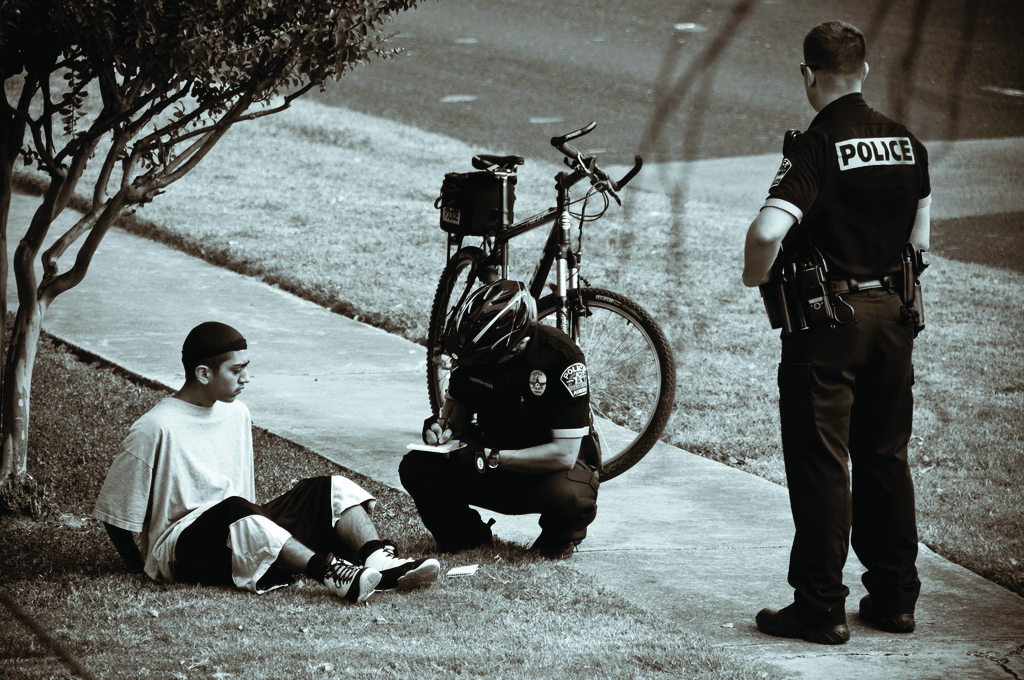As teenage brothers Thomas and Lloyd descended a staircase with fellow prospective students of Colorado State University, the excitement of visiting their dream school quickly unraveled.
At the bottom of the steps stood two uniformed men, waiting to pull them aside. The brothers had made the seven hour drive all the way from Santa Cruz, New Mexico and were just twenty minutes into the tour. But instead of moving on through to the gymnasium like the rest of the group, they were suddenly answering a barrage of questions from police officers.
Why? Because a white woman in the group made a call to police. She was worried — even felt sick — that the boys might be a danger. They were just too quiet, just too “creepy.”
The brothers—both Native Americans from the Mohawk Tribe who moved to New Mexico ten years prior—were told to put their hands up. An officer patted one of the brothers down. Police questioned if they were part of the group, and only released them after they offered proof that they were indeed registered for the tour. By the time they were free to go, the group had already made their way across campus. The brothers turned around and went home.
That same day, in Rialto, CA a group of four women, including Bob Marley's eldest granddaughter, loaded luggage into the back of their car and exited a home they were renting off of Airbnb. Minutes later, several police cars surrounded them. A white neighbor had called the cops after the women – three of whom are black – failed to wave to her as they pulled out of the driveway. This, she assumed, meant they were surely burglarizing the house. The women say police detained them for forty-five minutes before letting them go.
Two weeks earlier, across the country in Philadelphia, PA two Black men entered a Starbucks and waited for a white business associate to arrive. Within minutes, a Starbucks employee called police because the two men had not yet made a purchase. Officers handcuffed the men, placed them under arrest, and escorted them out of a coffee shop full of white onlookers, in an affluent white neighborhood.
All three of these instances demonstrate just how dangerous white people’s assumptions about people of color are. Their fears — however groundless and absurd — are backed by the power of the police and have profoundly negative consequences on people’s ability to live in dignity.
Their fears — however groundless and absurd — are backed by the power of the police and have profoundly negative consequences on people’s ability to live in dignity.
Attending a campus tour, waiting in Starbucks, or leaving an Airbnb should have been ordinary experiences, but they turned into something altogether frightening and humiliating with one phone call. These instances happened to be caught on camera and were circulated widely enough to spark outrage, but they are just a small sample of the dangerous confrontations that people of color experience on a routine basis across our country.
One such example occurred right here in our state not long ago.
The ACLU of New Mexico is currently litigating a case on behalf of a Native American man who stopped in a Santa Fe driveway one night to attend to his sick dog. The white owner of the house called police when she pulled into her driveway and saw Mr. Romero, even after he tried to explain that he was only attending to his dog and wanted to get on his way.
When the responding officer arrived, he ordered Mr. Romero to the ground at gunpoint, placed him in handcuffs, and put him in the back of a patrol car without listening to his side of the story.
The sad irony in all of these cases is, the people who called police out of a fear of danger, wound up inflicting harm and humiliation on the very people they were afraid of. Racial bias and discrimination are so deep-seated in this country that they masquerade as credible fear.
Racial bias and discrimination are so deep-seated in this country that they masquerade as credible fear.
These injustices must stop. We all have biases, both conscious and unconscious, but it is our responsibility to ensure that those biases do not cause others harm. As white people occupying a place of privilege within a society plagued with systemic racism, it is our responsibility to step back, slow down, and examine how our own internal biases are affecting how we perceive external threats. We must also demand that our law enforcement officials get the training they need to avoid the kind of bias-based policing that endangers the lives, safety, and human dignity of people like Mr. Romero.
The national ACLU Racial Justice Project recently announced that it will represent brothers Thomas and Lloyd, and the ACLU of New Mexico will fight for Mr. Romero and anyone else who suffers racial discrimination at the hands of police in New Mexico. But as this spate of high profile incidents demonstrates this isn’t just a battle that can be won solely in the courts. This requires those of us in positions of privilege to stop projecting violence and suspicion on to people of color and to reject the prejudices learned from living in a society imbued with structural racism. It might very well be what keeps an innocent person out of handcuffs someday.
